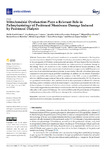Mitochondrial dysfunction plays a relevant role in pathophysiology of peritoneal membrane damage induced by peritoneal dialysis

Use this link to cite
http://hdl.handle.net/2183/27648
Except where otherwise noted, this item's license is described as Creative Commons Attribution 4.0 International License (CC-BY 4.0)
Collections
- Investigación (FCS) [1293]
Metadata
Show full item recordTitle
Mitochondrial dysfunction plays a relevant role in pathophysiology of peritoneal membrane damage induced by peritoneal dialysisAuthor(s)
Date
2021-03-13Citation
Ramil-Gómez O, Rodríguez-Carmona A, Fernández-Rodríguez JA, Pérez-Fontán M, Ferreiro-Hermida T, López-Pardo M, Pérez-López T, López-Armada MJ. Mitochondrial dysfunction plays a relevant role in pathophysiology of peritoneal membrane damage induced by peritoneal dialysis. Antioxidants (Basel). 2021 Mar 13;10(3):447.
Abstract
[Abstract]
Preservation of the peritoneal membrane is an essential determinant of the long-term outcome of peritoneal dialysis (PD). Epithelial-to-mesenchymal transition (EMT) plays a central role in the pathogenesis of PD-related peritoneal membrane injury. We hypothesized that mitochondria may be implicated in the mechanisms that initiate and sustain peritoneal membrane damage in this setting. Hence, we carried out ex vivo studies of effluent-derived human mesothelial cells, which disclosed a significant increase in mitochondrial reactive oxygen species (mtROS) production and a loss of mitochondrial membrane potential in mesothelial cells with a fibroblast phenotype, compared to those preserving an epithelial morphology. In addition, in vitro studies of omentum-derived mesothelial cells identified mtROS as mediators of the EMT process as mitoTEMPO, a selective mtROS scavenger, reduced fibronectin protein expression induced by TGF-ß1. Moreover, we quantified mitochondrial DNA (mtDNA) levels in the supernatant of effluent PD solutions, disclosing a direct correlation with small solute transport characteristics (as estimated from the ratio dialysate/plasma of creatinine at 240 min), and an inverse correlation with peritoneal ultrafiltration. These results suggest that mitochondria are involved in the EMT that human peritoneal mesothelial cells suffer in the course of PD therapy. The level of mtDNA in the effluent dialysate of PD patients could perform as a biomarker of PD-induced damage to the peritoneal membrane.
Keywords
Peritoneal dialysis
Epithelial-to-mesenchymal transition
Oxidative stress
Mitochondria
Mitochondrial DNA
Biomarker
Mesothelial cells
Epithelial-to-mesenchymal transition
Oxidative stress
Mitochondria
Mitochondrial DNA
Biomarker
Mesothelial cells
Editor version
Rights
Creative Commons Attribution 4.0 International License (CC-BY 4.0)
ISSN
2076-3921






